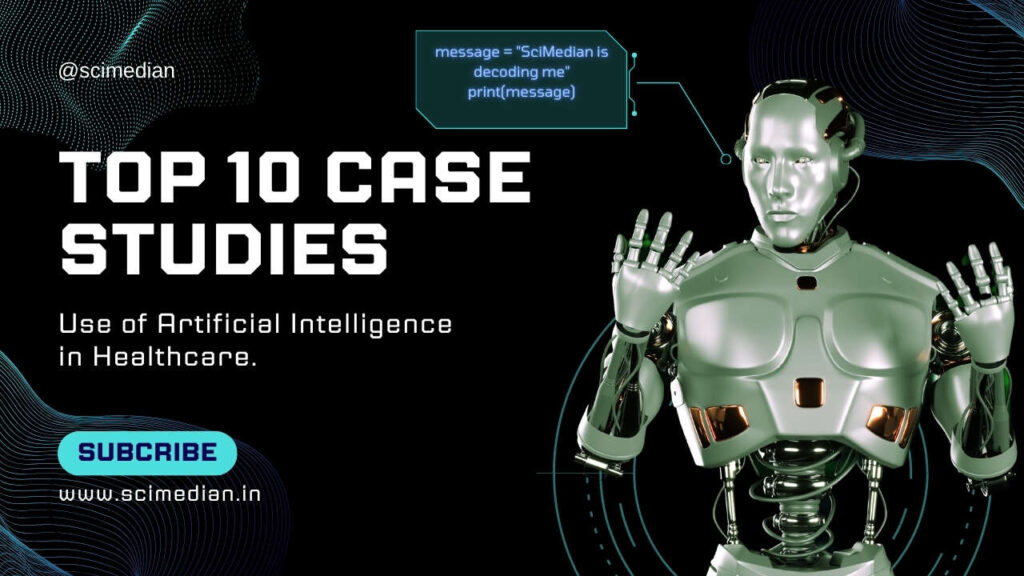This blog is about 10 Case Studies of Successful Implementation of AI in Healthcare. Artificial intelligence (AI) is rapidly transforming healthcare services. Healthcare professionals rely on AI in various contexts, including diagnosis, radiology, clinical research, patient monitoring, and managing electronic health records.
In today’s blog, we won’t be discussing the general uses of AI in healthcare, as we’ve already covered that in a previous post, which you can easily access on our website, scimedian. Instead, we’ll explore 10 Case Studies of Successful Implementation of AI in Healthcare.

Our first example is Google itself
1. Google’s DeepMind in Early Diagnosis
- Google’s DeepMind has developed an AI algorithm that can detect over 50 eye diseases from retinal scans with high accuracy. This significant achievement facilitates early intervention and improved patient outcomes, addressing the challenge of timely disease recognition in ophthalmology1.
2. Aidoc’s Radiology Platform
- Aidoc is an AI-driven radiology platform that supports radiologists by prioritizing critical cases and detecting abnormalities in medical images. This innovation has significantly enhanced diagnostic processes, allowing healthcare providers to expedite treatment for patients with urgent needs1.
3. Mayo Clinic’s Use of AI for Predictive Analytics
- The Mayo Clinic has collaborated with Google Cloud to develop an AI and machine learning platform that aids in patient care and research. This includes using algorithms to automatically perform complex calculations, such as assessing breast cancer risk, thereby providing clinicians with a diverse array of tools for improved patient outcomes5.
4. IBM Watson Health’s Personalized Medicine
- The Mayo Clinic also partnered with IBM Watson Health to implement AI in personalized medicine. The AI system analyzes extensive patient data, including genetic profiles, which leads to tailored treatment suggestions. This approach has notably improved response rates and treatment outcomes, especially in oncology1.
5. Atomwise in Drug Discovery
- Atomwise utilizes its AtomNet platform to accelerate drug discovery through AI. It scans millions of compounds in collaboration with research institutions and has successfully identified potential treatments, such as for the Ebola virus within a day, demonstrating a drastic reduction in drug discovery timelines from years to months6.
6. Valley Medical Center’s Utilization Management
- Valley Medical Center implemented the CORTEX® AI solution to enhance its utilization management processes. This led to a substantial 67% improvement in case review volume, allowing all reviews to be completed compared to just 60% prior to the implementation. Nurses could now focus on clinical merits rather than solely on criteria-based assessments5.
7. AI-assisted predictive Analytics for Readmissions
- A large urban hospital network adopted AI-driven predictive analytics to diminish unnecessary patient readmissions. By developing an AI model with historical patient data, the hospital achieved a 20% reduction in 30-day readmission rates and realized annual cost savings of $4 million while simultaneously improving patient satisfaction scores6.
8. Boston Children’s Hospital with Virtual Nursing Assistants
- Boston Children’s Hospital implemented AI-powered virtual nursing assistants to enhance patient care. These assistants, which are voice-activated and integrated with hospital systems, allow nurses to manage their workloads more effectively, improving patient interaction and care quality overall6.
9. Exscientia’s AI-Driven Precision Medicine
- Exscientia is at the forefront of AI in biopharma, developing precision medicine through its unique AI technology. The company’s advanced platform has successfully guided treatment selection in a clinical study, showcasing the potential of AI to improve patient outcomes by identifying the most suitable treatments for individuals4.
10. Insilico Medicine and AI-Designed Drugs
- Insilico Medicine employs AI throughout its drug discovery and development processes. It recently celebrated the success of INS018_055, the first fully AI-discovered drug to enter phase 2 clinical trials. This accomplishment marks a significant milestone for AI in healthcare, emphasizing its role in expediting treatment availability
Conclusion
The integration of AI in healthcare is transforming the industry, making it more efficient, accurate, and personalized. From early diagnosis with Google’s DeepMind to personalized medicine with IBM Watson Health, these case studies highlight the real-world impact of AI. Companies like Aidoc, Atomwise, and Exscientia are pushing the boundaries, accelerating drug discovery, and improving clinical outcomes. The success stories from Mayo Clinic, Valley Medical Center, and Boston Children’s Hospital demonstrate the practical benefits of AI in enhancing patient care and operational efficiency.
As AI technology continues to evolve, its applications in healthcare will expand, leading to more breakthroughs and better patient experiences. The future of healthcare is bright with AI, promising a new era of medical innovation and improved health outcomes for all.




